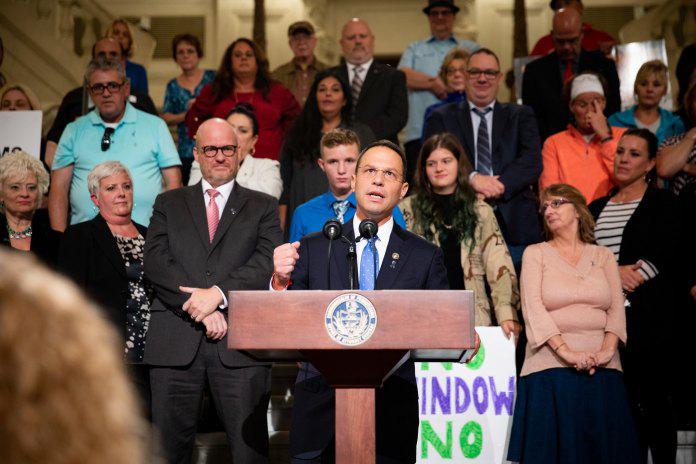|
‘I continue to be optimistic,’ Attorney General Josh Shapiro says as Pa. House kick-starts reforms on child sexual abuse
By John L. Micek
Eight months after his office released a landmark grand jury report that detailed decades of sexual abuse by hundreds of Roman Catholic priests and a subsequent cover-up, Pennsylvania Attorney General Josh Shapiro is still searching for justice for the victims. “I continue to be optimistic,” Shapiro said Wednesday during a wide-ranging interview with the Capital-Star in his Harrisburg office. “And I know that this has to get done.” The “this” that Shapiro is talking about are the four recommendations included in the 884-page grand jury report that lays out, in graphic detail, the abuse committed against thousands of children by priests who were shuttled from diocese to diocese, where they were allowed to abuse again. Those recommendations include eliminating the criminal statute of limitations and the creation of a “civil window” that would allow older victims to sue in civil court. A push for those changes fell apart last fall, on the final day of the 2018 legislative session, when the Republican-controlled state Senate failed to reach a consensus on a plan offered by President Pro Tempore Joe Scarnati. Under the proposal, victims would have been able to sue individual perpetrators, but not such institutions as the Catholic Church, which hid the abuse, The Philadelphia Inquirer reported at the time. Some victims saw Scarnati’s proposal as an attempt to cover for the church, since many of the priests named in the grand jury report were long dead. Shapiro, at the time, said the Senate had “just decided to quit and go home,” rather than try to reach an accord. On Wednesday, two Berks County lawmakers in the state House, Democratic Rep. Mark Rozzi and Republican Rep. Jim Gregory, rolled out bills aimed at reigniting the statute of limitations debate, PennLive reported. Rozzi’s proposal would eliminate the criminal statute of limitations, and extend the deadline for filing a civil sexual abuse claim from the current age of 30 to 55, PennLive reported. But, critically, the bill does not include the so-called “two-year look back” for older abuse victims. Gregory’s bill calls for a constitutional amendment eliminating what’s known as the “remedies clause” in Pennsylvania’s foundational document, which critics said was the main obstacle standing in the way of the two-year look back. Both bills were quickly ushered into the House Judiciary Committee. Neither has the standard memo seeking co-sponsors. “We can’t keep doing the same things over and over and expect different results,” Rozzi told PennLive on Wednesday. “It’s not going to happen. A two-year window is not going to happen anytime soon. Why not get this moving? We can do a constitutional amendment to actually move forward and get the House and Senate onboard standing with victims.” In a statement released Thursday, Shapiro said he still wants to see the General Assembly “pass the four reforms recommended by the Grand Jury, which spent over two years investigating child sexual abuse and cover-up within the Catholic Church.” “Those reforms have strong support in the Legislature and would strengthen mandatory reporting laws, clarify the law on confidentiality agreements to ensure victims know they can speak with law enforcement, eliminate the criminal statute of limitations for sexual abuse, and open a window in the civil statute of limitations so victims can finally have their voices heard in court,” the statement reads. Speaking to the Capital-Star Wednesday, Shapiro said he was encouraged by legislation, sponsored by freshman Sen. Katie Muth, D-Montgomery, and a coalition of Senate Democrats, that abolishes both the civil and criminal statutes of limitation for sexual abuse and provides for the two-year look back, among other measures. “This is broader than just abuse at the hands of a predator priest,” Shapiro said, pointing to instances of abuse by educators and physicians.
|
.
Any original material on these pages is copyright © BishopAccountability.org 2004. Reproduce freely with attribution.
